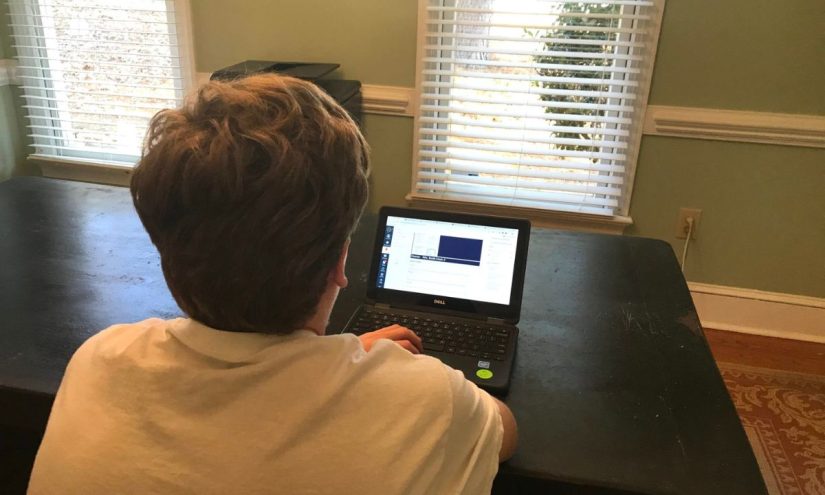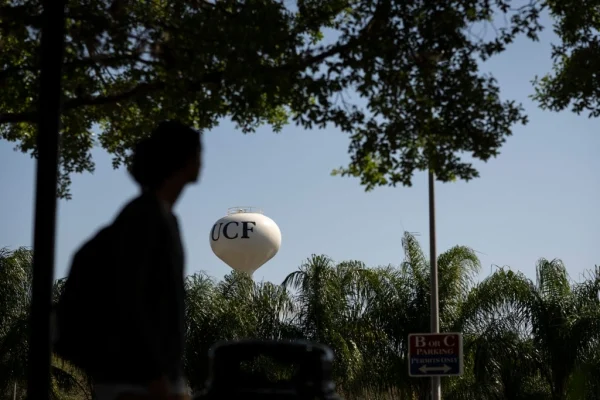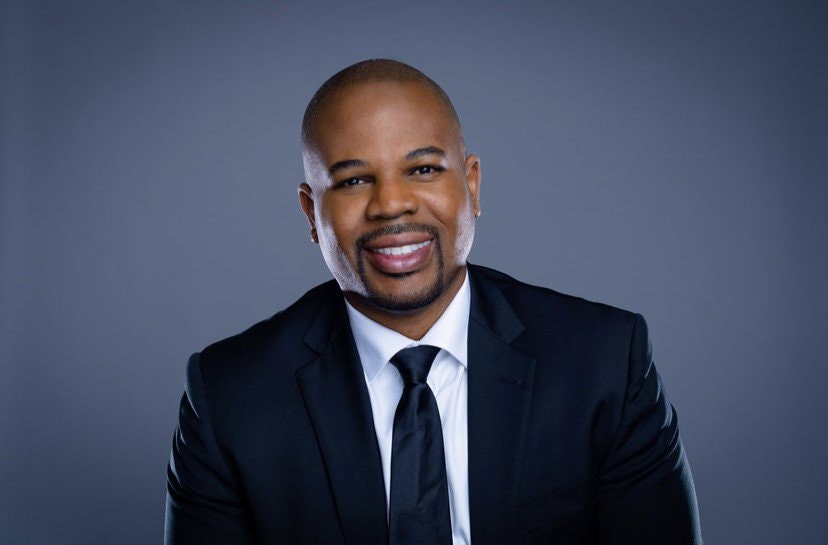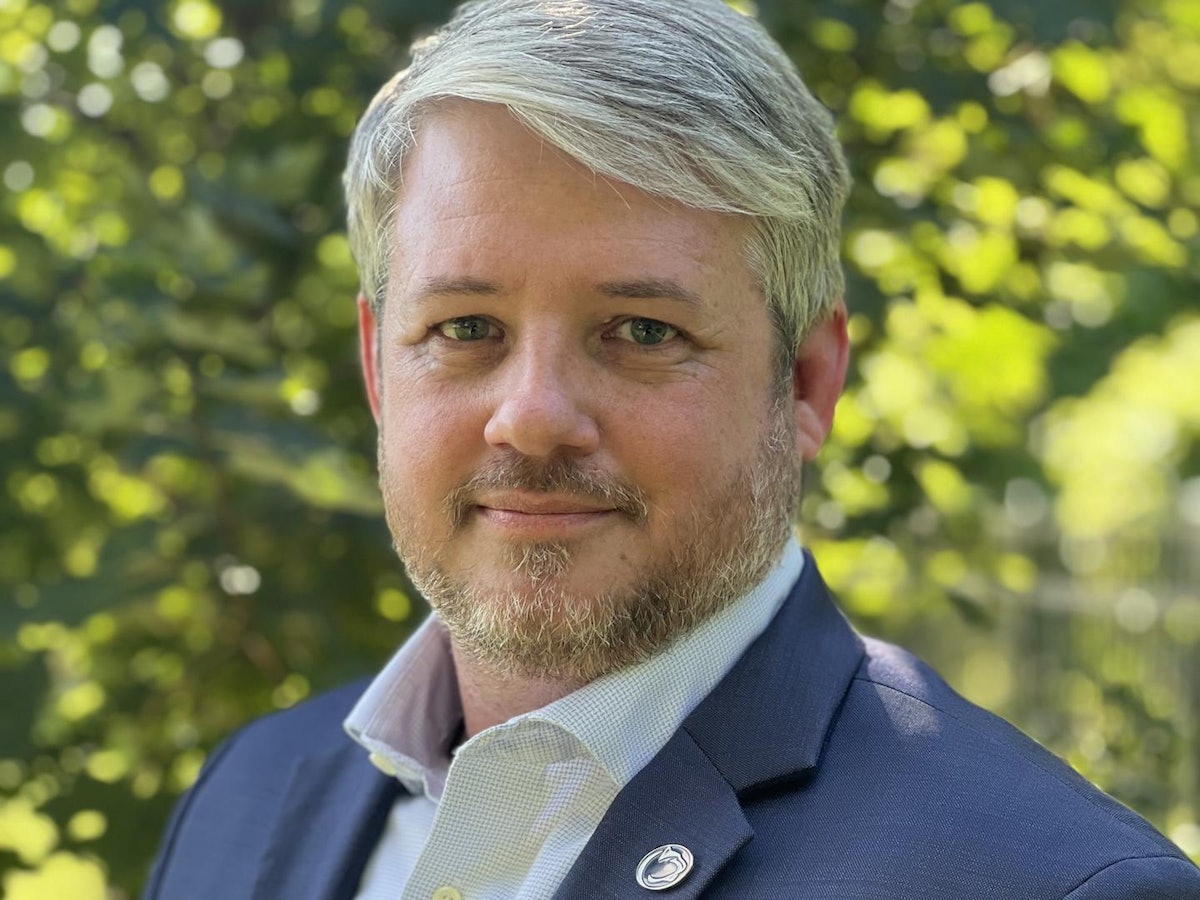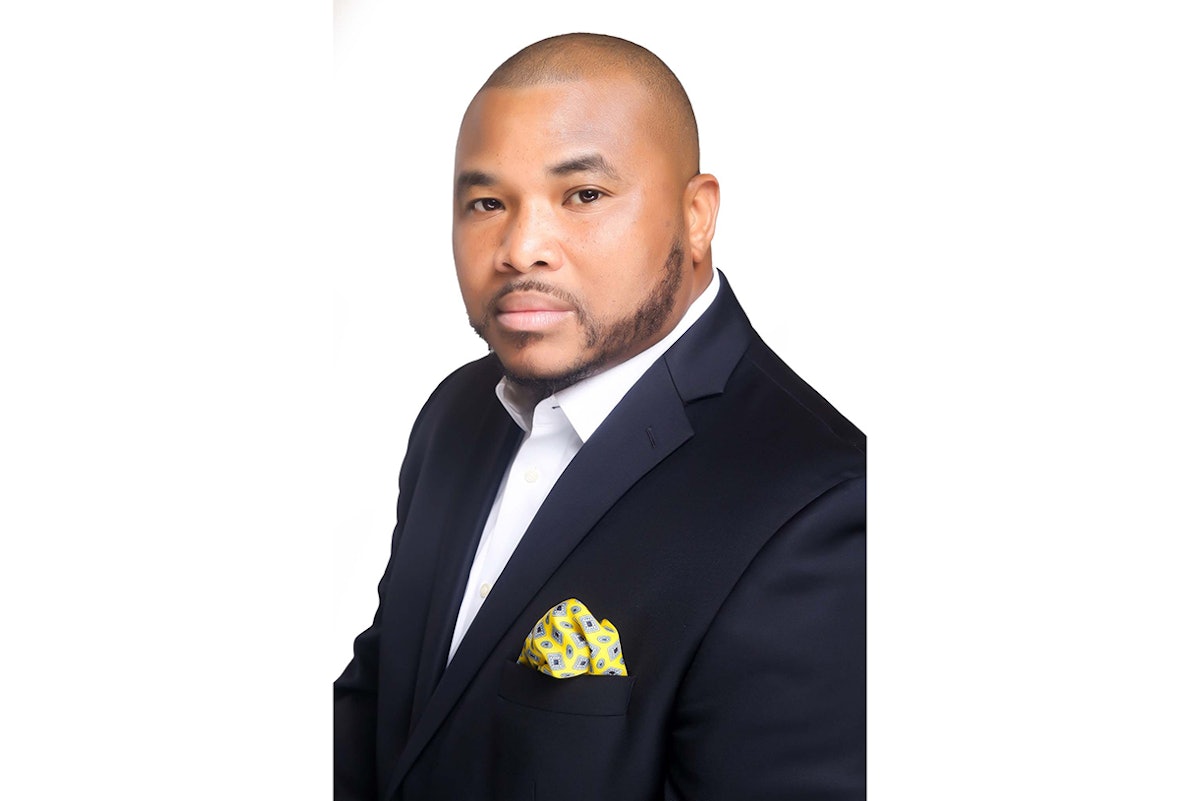Get stories like this delivered straight to your inbox. Sign up for The 74 Newsletter
One big budget bill and 181 executive orders into the Trump administration, one thing is clear for those of us checking our crystal balls ahead of the school year.
There is a big difference between policy change aligned to winning an election and disruption for the sake of chaos.
The three-sentence email sent on June 30 that froze billions of dollars of funding across the education continuum in Republican and Democratic counties around the country the night before the funding was anticipated begs the overarching question facing those working in education:
To state the obvious, the review of the federal funding could have been announced and conducted ahead of the date funds are normally made available, and the disruption could have been minimized.
Instead, leaders on the right and the left had to write letters, file lawsuits, and respond to panicking constituents to move money Congress had already approved to be spent.
“The education formula funding included in the FY2025 Continuing Resolution Act supports critical programs that so many rely on. The programs are ones that enjoy longstanding, bipartisan support,” said Republican U.S. Sen. Shelley Moore Capito from West Virginia.
Many leaders on both sides of the aisle, including Superintendent Mo Green, a Democrat, are hoping for “a return to the predictable, reliable federal partnership that our schools need to serve students effectively.”
That remains aspirational as the federal Department of Education begins to be dismantled, more responsibility is handed off to states, and local and state education agencies have to find ways to work with multiple federal agencies moving forward.
Recently at the summer convening of the National Governors Association, when Colorado Gov. Jared Polis asked U.S. Secretary of Education Linda McMahon for clearer communication, she said, “No guarantees from me that we’ll eliminate all the communication gaps that do happen.”
Our top 10 issues are not the ones featuring most prominently in the news cycle right now.
DEI continues to be in the news, and in case you missed it, over the summer EdNC published perspectives on DEI by a policymaker, a former superintendent, and an educator.
Cellphones and AI in classrooms also continue to be highlighted in the media.
And we know there are many, many other issues you care about, including WNC recovery, literacy, youth wellbeing, learning differences, community schools, school safety, vaccines and school health, school performance and the portfolio model, LGBTQ+ youth, the health of teacher and principal pipelines, STEM, arts and education, and more.
As we head back to school, the EdNC team will continue to cover all of those issues, but here are the top 10 issues we think will frame this school year.
Access to education, opportunity, and the American dream
1. Access to education for immigrants without legal status
For more than 40 years, students without legal status to be in the country have been allowed to attend public schools free of charge in districts across the United States, and over time that has included access to early education and postsecondary opportunities.
Federal case law cites reasons for this decision, including:
- Not wanting to penalize children for their presence in the country;
- Recognizing that many students will remain in the country, some becoming lawful residents or citizens;
- Not perpetuating “a subclass of illiterates within our boundaries, surely adding to the problems and costs of unemployment, welfare, and crime;” and
- Concluding that “whatever savings might be achieved by denying these children an education, they are wholly insubstantial in light of the costs involved to these children, the State, and the Nation.”
The 74 recently reported, “From cradle to career, President Donald Trump has launched a comprehensive campaign to close off education to undocumented immigrants, undercutting, advocates say, the very reason many came to the United States: for a chance at a better life.”
Immigrants without legal status have had access to Head Start since a 1998 interpretation of the Personal Responsibility and Work Opportunity Reconciliation Act of 1996 (PRWORA).
“Head Start is the federally funded, comprehensive preschool program designed to meet the emotional, social, health, nutritional, and psychological needs of children aged 3 to 5 and their families,” according to the N.C. Department of Health and Human Services (DHHS).
“The Early Head Start program — established in 1994 — is the companion program created to address the same needs of children birth to age 3, expectant mothers, and their families,” says the DHHS website.
On July 10, the U.S. Department of Health and Human Services (HHS) said via press release, “Head Start is reserved for American citizens from now on.”
“For too long, the government has diverted hardworking Americans’ tax dollars to incentivize illegal immigration,” said HHS Secretary Robert F. Kennedy, Jr.
The policy shift, says the release, aligns with “recent Executive Orders by President Trump, including Executive Order 14218 of February 19, 2025, ‘Ending Taxpayer Subsidization of Open Borders,’ prioritizing legal compliance and the protection of public benefits for eligible Americans.”
An HHS impact analysis finds, “These figures point to approximately 500,000 children under the age of 5 in poverty who have an unauthorized parent or are unauthorized themselves. Combining this estimate with an estimate that Head Start programs serve approximately 26% of the potentially eligible population, we anticipate that approximately 115,000 Head Start children and families could be impacted, or about 16% of total cumulative enrollment in Head Start programs in FY 2024.”
Also on July 10, “The U.S. Department of Education today announced it will end taxpayer subsidization of illegal aliens in career, technical, and adult education programs.”
The department says that postsecondary education programs — “including adult education programs authorized under Title II of the Workforce Innovation and Opportunity Act of 2014, postsecondary career and technical education programs under the Carl D. Perkins Career and Technical Education Act of 2006, and other programs when used to fund postsecondary learning opportunities” — also constitute “federal public benefits” subject to citizenship verification requirements.
“This policy shift threatens to undermine community development, workforce readiness, and economic mobility across the nation,” says a statement issued by The Presidents’ Alliance on Higher Education and Immigration, an alliance of American college and university leaders. “Many of the named programs are a central component of the nation’s community colleges and provide access for continuing and returning adult learners.”
In 1988 — after the U.S. Supreme Court decision that safeguarded access to K-12 but before the 1996 law that expanded access beyond elementary and secondary education — Dallas Herring, beloved and known as the father of North Carolina’s community college system, wrote, “The twentieth century, by every standard of assessment, in the long view of history, must be considered one of the most remarkable in the experience of mankind. It is especially significant in education, for the opportunity to study and to learn has been extended during these times to almost all of the people everywhere in America. Total education is becoming a possibility as the people respond to the challenge of universal opportunity in education. The door, at last, is open.”
Herring also wrote — as the dawn of not just a new century approached but of a new millennium — that “it was clear that the open door is not enough.”
As the open door begins to close, Herring reminds us what is at stake. “Education of the masses of humanity, not only as economic beings, but especially as human beings, will be essential to the achievement of peace and prosperity,” he wrote.
Data from the Census Bureau population estimates indicate that the nation’s population growth rate in 2023-24 was driven mostly by immigration.
Twenty states and the District of Columbia have filed suit. North Carolina is not one of the 20.
2. Pathways to work are more important than ever
It is almost impossible these days to have a conversation about community colleges, postsecondary access, or attainment without the word pathways coming up.
Sometimes leaders are talking about “guided pathways,” which is a college-wide approach to student success. Nationally, that work had been shifting from an outcomes approach to an access approach.
A much anticipated book to be published by Harvard Education Press in August, “More Essential Than Ever: Community College Pathways to Educational and Career Success,” promises guidance for college leaders and state policymakers.
The cliff notes, according to the authors: “Community colleges today will need to make concerted efforts to strengthen pathways to post-completion success in employment and further education and thus ensure that students’ investment of effort, time, and money pays off.”
“Seamless pathways” often refer to agreements between community college and four-year colleges and universities that improve transfer and graduation rates by improving the student experience.
In 24 states, more than 200 community colleges now offer four-year degrees. North Carolina is not one of them, and a recent essay says, “The debate over who and where bachelor’s degrees should be offered is too often driven by institutional priorities and policies set in the past…. Community colleges can play a central role in helping graduates achieve a bachelor’s degree. States and all colleges should support these low-cost, high-value degree pathways.”
But, both across the nation and our state, it is the pathways for students to enlist, enroll, or employ so they have access to a family-sustaining living wage that is the focus for many leaders, organizations, and initiatives.
And, in North Carolina, it is these pathways that are critically important to the state’s attainment goal.
Citing the 4.6 million youth between the ages of 16 and 24 who are neither enrolled in school nor working a job, the National Governors Association (NGA) is focusing this year on getting students ready for jobs.
In partnership with NGA, America Achieves recently launched its Good Jobs Economy initiative, designed to “build a prosperous, competitive nation where everyone has clear pathways to good jobs, employers access the talent they need, and Americans at large scale can reach and stay in the middle class.”
Lumina Foundation recently announced a new initiative called “FutureReady States” with the goal of increasing access to education and credential training that “pays off in the labor market.”
StriveTogether — a national network with the goal of having 4 million more youth in the United States on a path to economic opportunity by 2030 — has an impact fund that identifies opportunities to improve the experiences of students in high school to set them on a path to college and careers.
Much of this leadership at both the national and state level focuses on different experiences that expedite that pathway for students who want to go from high school or community college graduation straight into the workforce.
It is in this work where terms like work-based learning, apprenticeships, internships, co-ops, and credentials of value; approaches like graduation from high school in three years; and innovative initiatives like SparkNC and the NC Works website come in.
In keeping with this trend, the Federal Reserve Bank of Richmond is implementing a new approach to measuring success through its Survey of Community College Outcomes, “which broadens the definition of community college student success to include not only degree attainment, but also attainment of shorter-term credentials, such as certificates or industry licensures, successful transfer to a four-year institution, or persistence in enrollment beyond four years.”
According to a press release from the N.C. Community College System, beginning in July 2026, the new Workforce Pell Grant program will allow eligible students to use federal financial aid for short-term, high-quality training programs — some as short as eight weeks depending on instructional hours and program design. These programs lead directly to jobs in high-demand fields like health care, engineering and advanced manufacturing, trades and transportation, and information technology, says the release.
“This is a major step forward in making higher education more accessible and responsive to today’s workforce needs,” said Jeff Cox, president of the system.
With a community college system that is 58 strong; a nationally watched model for funding community colleges called Propel; Boost, North Carolina’s accelerated college to career program; and a system whose leadership is in transition again, all eyes are on North Carolina.
3. Exposing middle school students to college
A May 2025 headline in the Associated Press asks, “Can middle schoolers handle college?”
When students at Valle Crucis School (VCS) were displaced after Hurricane Helene, Caldwell Community College & Technical Institute stepped up to host Principal Bonnie Smith, her team, and 120 sixth through eighth grade students on the community college’s campus in Watauga County.
President Mark Poarch said the middle school students were exposed through the experience to many positives and had the opportunity to learn more about college programs and how they connect to industries.
“I think there are a lot of silver linings in having them on a college campus,” said Poarch. So many that the community college’s foundation guaranteed a scholarship for all current VCS middle school students.
“It has brought new energy and new life to this campus unlike anything we’ve ever seen before,” said Poarch.
In Haywood County, another model for exposing middle school students to college will launch in 2026-27.
The innovative new middle school, developed in partnership with Haywood Community College, will be academically rigorous and led by Lori Fox, the principal of Haywood Early College. Under her leadership, the early college is among the best in the nation and an Apple Distinguished School.
California has been leading the way with exposing middle school students to college, and the state is now pushing to create access for more students — not just high achievers. In that state, middle school students may enroll in one community college course each semester free of charge.
Recent legislation back here in North Carolina requires all middle and high school students in public schools to have career development plans.
And a recent report using North Carolina data explores a new measure of school quality called “high school readiness.”
“As the name suggests, the basic idea is to capture how well a middle school prepares its students for the next stage of their education by quantifying its effects on high school grades — or to be more precise, ninth-grade grade-point averages,” says this article about the report.
4. Local, state, and philanthropic funding for the safety net for students and families
The different types of investments in pathways all share in common academic and/or social support for students.
The expensive and expansive budget bill recently passed by Congress cuts through the federal safety net that many in North Carolina and across the nation rely on, placing more of the responsibility on local and state governments.
An estimated 520,000 North Carolinians could lose their health insurance, according to this press release.
“When we think about Medicaid, we typically think about health insurance,” says an article published in Forbes about the impact of the policy change on schools. “But Medicaid is also among the largest funding sources for K–12 public schools, providing an estimated $7.5 billion annually to pay for essential services for student learning and development.”
Note that the above data is district data prior to Medicaid expansion in North Carolina.
Cuts to the Supplemental Nutrition Assistance Program (SNAP) are “equally serious,” says Gov. Josh Stein. As many as 1.4 million North Carolinians — including 600,000 children — could lose food assistance. EdNC previously reported the impact of cuts to SNAP by county in North Carolina.
According to reporting by the News & Observer, Stein also said, “the state has to be exceptionally conservative fiscally, meaning that we have to preserve the revenue sources we have to so that we can deal with issues like feeding hungry children, or ensuring that our health care system works for everybody.”
Some counties are waiting to see how the state responds before they consider how to address the gap in federal support. Others counties, like Jackson County, are moving ahead with funding free schools meals for all for the school year.
The advocacy of coalitions like School Meals for All NC has never been more important at every level of government.
School choice and the funding of public education
5. Wordsmithing school choice: Choice vs. fit, uniform vs. plural, quality vs. accountability, and the impact of churn
Choice in the context of “school choice” is a political term. It’s not how parents talk or think. All over the world, parents use the word “fit” to describe how they select a school for their child.
And fit is different for different parents. For some, it is about the teacher or the principal. For others, it is about attending school with kids from the neighborhood. For many, it is has to do with the type of educational experience the school provides.
Public schools continue to provide more opportunities for fit than any other educational sector.
In North Carolina, there are 115 school districts and 2,700 schools, including 208 charters, seven lab schools, three residential schools, and one regional school. Public schools offer an abundance of fit through the following types of school options: year-round, magnet, language immersion, single-sex, early college, career academies, virtual academies, community schools, alternative schools, and more.
Check out how Buncombe County Schools is explaining why parents should choose public schools.
EdNC continues to cover the inter-relationship of those two terms, and the choices parents are actually making to find the right fit for their students.
We monitor enrollment across public schools, private schools, and homeschools. So far, even with school choice expansion fully funded, public school market share is holding steady at 84% — that’s 1,538,563 students.
We track the data on private school vouchers, called Opportunity Scholarships in North Carolina. So far, since school choice expansion, it is estimated that more than 90% of the new applicants for vouchers were already attending private school.
The data will be important moving forward in understanding parent choice and student fit, but there are broader trends to be aware of.
In North Carolina, our state constitution mandates a “general and uniform system of free public schools.” In democracies around the world, according to the leading research on educational pluralism conducted by Ashley Rogers Berner at the John Hopkins School of Education, uniform isn’t the north star and states don’t exclusively deliver education. But where other countries build choice into their systems, they also build in quality control.
Quality, not accountability, is the word of choice.
The legislature has charged the recently established Office of Learning Research — led by Jeni Corn and part of the Collaboratory at UNC — to recommend a nationally standardized test for use in third and eighth grade by private and public schools for 2026-27. For more information, see section 3J.23 of this bill.
A necessary first step, that in and of itself does not guarantee quality or accountability. EdNC joined a delegation from California that was in Boston looking at how the public schools there have more comprehensively partnered with religious schools, including in the areas of testing, professional development, and curriculum.
Berner talks about why school choice isn’t enough, and why academic content needs to change and expectations need to increase regardless of setting.
“To be blunt, a libertarian, let-a-thousand-flowers-bloom approach,” she says, is unlikely to move important data points at scale. She has interesting things to say about curriculum — think of the big bet Jackson County made on the Wit & Wisdom curriculum under the leadership of Superintendent Dana Ayers.
Because fit matters to parents, with school choice comes more “churn,” sometimes also called “swirl.”
“There are real, tangible impacts on a students’ learning and wellbeing at every churn — especially mid-year,” says a recent article titled, “School choice is great, but the churn it allows comes at a cost.” Researchers are calling for educational navigators, formal transfer windows, and better, more accessible information about schools for parents making the decisions.
Ray Gronberg with the NC Tribune first reported on how the race between Phil Berger and Sam Page will feature key differences in school choice between Republican candidates.
Berger favors what he calls “universal school choice.”
Page’s website says he believes school “vouchers should be targeted to families who need them most.” That means, writes Gronberg, “income caps on school voucher eligibility to help working families, not the wealthy” and “policies to prevent private schools from inflating tuition due to vouchers.”
6. The relationship between education spending and teacher pay
Page also favors “raising teacher starting pay to $50,000 to keep North Carolina competitive,” which brings us to the relationship between education spending and teacher pay.
As the wait for the Leandro decision on school funding continues, given the changes at the federal level and the impact of Hurricane Helene, there is going to be even more pressure on state appropriations for education unless and until Republicans come to a different meeting of the minds on tax policy.
The N.C. Department of Public Instruction’s “Highlights” is our go-to source for information on education funding and budgets. North Carolina spent about $12.6 billion on public education in 2024-25, and almost 60% of that goes to instructional personnel and related services.
Nationally, studies find that school spending is up, but teacher salaries are not.
In 2024, the libertarian Reason Foundation published this report that found inflation-adjusted, per-pupil spending had risen across the country — in every state except North Carolina. “North Carolina’s inflation-adjusted education revenue grew from $10,806 per student in 2002 to $10,790 per student in 2020, a −0.1% growth rate that ranked 50th in the U.S.,” says the report.
Meanwhile, writes Chad Aldeman, an education analyst, “pay for other college-educated workers has risen steadily, leaving teachers behind.”
One consequence is that teachers are increasingly being priced out of housing in their district, finds Aldeman, citing research by the National Council on Teacher Quality.
BEST NC has advocated for teacher pay as well as advanced teaching roles that are already leading to higher pay for educators. Leah Sutton, who used to work for BEST NC, now leads the advanced teaching roles program for DPI.
The Public School Forum of North Carolina has been convening a working group to study a weighted-student funding formula. While that organization’s leadership is in transition, the work is ongoing, led by Lauren Fox and Elizabeth Paul. A recent grant from the Kellogg Foundation — in addition to other funding — will support the study moving forward with the working group next scheduled to meet in September.
The support of legislators continues to be important.
In 2023, Senators Michael Lee, Amy Galey, and Lisa Barnes sponsored a bill that would convert North Carolina’s funding formula to a weighted student funding (WSF) model. In early 2025, Lee led a discussion about school funding at the Hunt Institute’s Holshouser Retreat.
“This is an incredibly important issue for education in North Carolina,” Lee said to his fellow legislators. “We have to move forward to get something done, and that will require us to work in a bipartisan way with Superintendent Green and the governor.”
Nationally, 41 states use student-based funding in their formula, and in some Republican states, more than $1 billion has been invested in the shift.
This issue is not new: One of WestEd’s supporting reports in the Leandro case addressed cost adequacy, distribution, and alignment of funding. It’s more than five years old now, but you can find it here.
7. The health of district fund balances
The Local Government Commission — a commission within the state treasurer’s office — annually collects fund balance data for North Carolina’s 115 school districts. In an email to EdNC from the LGC back in 2020, fund balances were described as “a savings account that schools can use” if they have unanticipated expenses or opportunities.
In Durham County Public Schools and Winston-Salem/Forsyth Public Schools, fund balances have been in the news as districts cope with accounting errors, highlighting the important of the CFO role.
In western North Carolina, fund balances have been in the news as school districts rely on them to make ends meet given the decline in local revenue from the loss of tourism.
An interesting realization emerging from Hurricane Helene is that community colleges don’t have fund balances — which is a different problem.
Last year, EdNC published a 10-year look at fund balances for school districts.
Here is updated data through June 30, 2024, which is before both the Sept. 30, 2024 end of federal funding for COVID and Hurricane Helene. We are anxiously waiting to see the hit on fund balances that we anticipate in the June 30, 2025 data, which will likely be ready in early 2026.
The state of messaging and advocacy
In these polarized, politicized times, both messaging and advocacy are changing across party lines.
When school choice expansion was announced in spring 2023, then-Gov. Roy Cooper reacted by declaring a state of emergency for public education. By January, he had iterated his language, declaring 2024 the year of public schools. He visited more than 60 child care centers, schools, community colleges, and businesses to highlight public education statewide.
The N.C. School Boards Association launched this “public education matters” website.
Higher Ed Works changed its name to Public Ed Works and launched a billboard campaign for teacher pay.
Parents for Educational Freedom in NC (PEFNC) recently celebrated its 20th anniversary, including a fireside chat with Secretary McMahon. Their website links to this school choice website to help parents navigate, and PEFNC now has a team of 13 parent liaisons, including some who speak Spanish.
Charter schools are having to navigate being both public schools and part of the school choice movement.
A poll by The Carolina Journal in January 2025 found that 55.2% of those surveyed were dissatisfied with the quality of K-12 education students receive in local public schools, and it also found that 56.8% of those surveyed were comfortable sending their students to local public schools.
Now draft pillars of Superintendent Mo Green’s strategic plan will include “Celebrate Why Public Education is the Best Choice” and “Galvanize Champions to Fully Invest In and Support Public Education.”
What’s the right mix of messaging, advocacy, and lobbying across all lines of difference to ensure adequate funding and continuous improvement at all schools for all students?
Sen. Kevin Corbin, R-Macon, tells constituents, “I can promise you what you won’t get. You won’t get things you don’t ask for.”
Cross-partisan strategies addressing the following key elements continue to hold promise at the local, state, and federal level, according to the Aspen Institute:
- Challenges and solutions must be easy to communicate and appeal to a broad base,
- Solutions are responsive to local context and garner local support,
- Parents, teachers, the business community, or politicians in higher office are willing to provide political cover for policymakers,
- Both sides can walk away claiming a win — even if each side’s “win” is different, and
- Using the media as an accelerant.
This year, we are paying close attention to how three important constituencies talk to the public and talk to policymakers: educators, business leaders, and parents.
8. From grass roots to grass tops, educators are finding different ways to lean in
Here are some examples of how educators at the local and state level are finding different ways to lean in to advocate with both the public and policymakers.
On Aug. 20, 2025, North Carolina’s educator-in-chief, Superintendent Green, will launch his strategic plan for public education, including community members, leaders, parents, and educators.
The North Carolina Principal of the Year Network is dedicated to showcasing the exemplary work occurring within North Carolina’s public schools, fostering a culture of excellence, and advocating for the advancement of school leaders and public education across the state. Their strategy is working: They have a new website, host regional trainings, and POY Elena Ashburn is now senior advisor for education policy to Gov. Stein.
In early 2024, the North Carolina Association of Educators (NCAE) released a strategic plan whose first priority is “Grow Our Union.” The organization’s goal is to have 30,000 members by 2030.
A principal in Madison County is circulating a proposal for teacher-storytellers to help us “better understand the state of every school system in WNC and eventually the state.”
9. Will business leaders come together and align on issues that matter?
When I was growing up, it seemed to me like business leaders — think Hugh McColl, Eddie Crutchfield, Rolfe Neill — had a bat line to both the governor and legislative leadership.
At the young age of 90, McColl recently said if he worries about something, it is about education.
The NC Chamber plays a critical role in education and workforce advocacy.
BEST NC is a nonprofit, nonpartisan coalition of business leaders committed to improving the education system through policy and advocacy.
The North Carolina Business Committee for Education (NCBCE) — a nonprofit that operates out of the office of the governor — works to make the critical connection between North Carolina employers and school districts through work-based learning.
The Public School Forum of North Carolina hosted a summit and continues to convene and inform business executives about the future of public education.
Nationally, the Business Roundtable is an association of more than 200 CEOs. Jim Goodnight, their website says, “spearheaded the creation of a national Business Roundtable report calling on business leaders to support and advocate for efforts to improve early learning and third-grade reading proficiency. In North Carolina, he rallied a group of CEOs to the cause.”
What if these leaders and organizations worked together, stood together more?
An example exists in philanthropy. Invest Early NC is an early childhood funders collaborative focused on outcomes for children and families prenatal to age 8 so children are healthy, safe, nurtured, learning, and ready to succeed by the end of third grade. The collaborative has adopted a bipartisan approach with public-private partnerships, lifting community voice to inform decision-making. The collaborative has staff, conducted a statewide landscape analysis, collectively weighs in on issues, and is now beginning to develop a 10-year plan.
This state loves being #1 for business. Longer term, we need to strive to be #1 for students and workers for that trend to hold.
10. This era for parent rights is complicated for students
No doubt we are living in a political era that values parents’ rights.
“Parents are the most natural protectors of their children. Yet many states and school districts have enacted policies that imply students need protection from their parents,” said Secretary McMahon. “These states and school districts have turned the concept of privacy on its head –prioritizing the privileges of government officials over the rights of parents and wellbeing of families. Going forward, the correct application of FERPA will be to empower all parents to protect their children from the radical ideologies that have taken over many schools.”
For students, it’s more complicated than the politics.
Schooling is compulsory in North Carolina, and teachers stand in loco parentis, or in the place of parents, for the 1,025 hours that children are in our public classrooms each year.
But our students spend the other 7,735 hours of their year outside the classroom and the school.
In data from 2015-23, you can see that one in 100 children in North Carolina now experience substantiated abuse or neglect by their parents, guardians, or caretakers.
And, in 2024, North Carolina’s chronic absenteeism rate was 25%, up from 15% in 2018.
The Hechinger Report finds, “Absenteeism cuts across economic lines. Students from both low- and high-income families are often absent as are high-achieving students.”
North Carolina law urges and requires consideration of what is in the best interests of the child, prioritizing child wellbeing, safety, and development.
Ensuring their best interests has historically required a comprehensive approach across all settings where they spend time — home, school, faith, and community — with teachers, parents, ministers, and community leaders all serving as checks on each other.
This article first appeared on EdNC and is republished here under a Creative Commons Attribution-NoDerivatives 4.0 International License.
Get stories like these delivered straight to your inbox. Sign up for The 74 Newsletter

